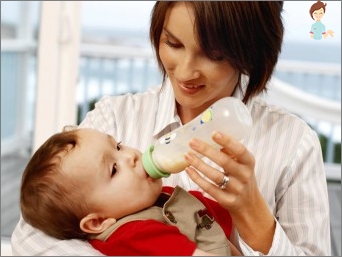Lactose insufficiency in infants: symptoms and treatment
What symptoms talk about lactose deficiency in children and which treatments exist? What you need to know the parents if the child has lactose failure
An unpleasant feeling in the stomach after receiving fermented milk products or bloating after serving seals can talk about lactose intolerance by the child’s body. And what if such a phenomenon is observed at the most gentle age when the baby is just starting to get acquainted with the outside world and eats only the maternal milk?
 What is lactose failure and how to deal with it, we will consider in our current article.
What is lactose failure and how to deal with it, we will consider in our current article.
What it is?
Lactose insufficiency is nothing but the intolerance to the consumption of dairy products, which arises due to the lack of an enzyme required to digest the lactose in the intestinal cavity. Thus, people suffering from this disease cannot use milk origin products that are not cleaving in the body.
If for adults this moment is solved quite simply by adjusting the diet, then lactose deficiency in newborns is a more serious problem. After all, the main component of the child’s nutrition is breast milk, which contains sets of beneficial substances vitally needed crumbs for growth and development.
But in mom’s milk, as well as most milk mixtures of baby food, contains milk sugar – lactose, which is the cause of intestinal problems.
In order for it to be learned in the body of infants, the mandatory presence of a special enzyme – lactase. But if it is not enough, the absorption of milk sugar is broken, and the products with its content are poorly transferred by the body. In the age of the age of the year, this problem is quite common and arises from several reasons.
Causes of lactose intolerance:
- Birth ahead of time. This is due to the fact that the enzyme begins to be produced in the body of the future crumbs from 24 weeks and later rapidly gains momentum. The body of premature babies simply does not have time to launch this process for full force;
- Genetic predisposition. Transferred by inheritance from parents, and unfortunately, it does not succumb to complete cure;
- Violation of lactase production due to some disease. In this case, the main thing is to find the main reason, and then the problem will solve automatically;
- Intestine dysbacteriosis arising due to imbalance in kid feeding mode. These signs can be seen in the first weeks of the child’s life and pay special attention to them.
In addition, lactose insufficiency is classified by 2 levels.
Primary – speaks of partial lactose intolerance and is accompanied by the preservation of the surface of enterocytes.
The secondary – the characteristic sign of lactose deficiency in infants is the violation of the cell surface, which produce the necessary enzyme and in this case there is a complete intolerance to the milk sugar.
Symptomatics
The main symptoms of lactose insufficiency look like this:
 The child has a liquid chair, which contains mucus and untarable food particles. It can be very frequent up to 10 times a day, or, on the contrary, is absent and requires additional stimulation;
The child has a liquid chair, which contains mucus and untarable food particles. It can be very frequent up to 10 times a day, or, on the contrary, is absent and requires additional stimulation;- When feeding, the child is worried;
- The kid has a bloating bloating;
- Kroch does not gain kilograms or, in general, loses weight;
- The child is fused when feeding and often crying;
- Frequent increased gas formation.
To confirm the diagnosis is usually prescribed feces analysis for lactose failure. If there is an increased sugar content in the range of 1%, high acidity and the presence of fatty acids, it is necessary to think about the treatment of lactose intolerance.
Treatment
In the primary lactose failure, problems with the processing of dairy products may be preserved during the life, but they are not absolute and compensated for by other useful bacteria that are produced by the intestinal microflora. Therefore, in this case, no special treatment is required, and it is just necessary to establish the work of the kid’s intestinal system.
Treatment of lactose deficiency of second order involves therapeutic measures to eliminate dysbacteriosis and accompanying enzymatic violations. As a rule, the reception of lactase and the use of special mixtures on therapeutic basis.
 At the same time, feeding with breast milk can not be suspended. But if the baby adds badly in weight and the situation does not change, then the doctor can recommend to completely switch to brine mixes and abandon breastfeeding.
At the same time, feeding with breast milk can not be suspended. But if the baby adds badly in weight and the situation does not change, then the doctor can recommend to completely switch to brine mixes and abandon breastfeeding.
Thus, we considered in detail the problem of lactose deficiency in infants and found out the moments to which parents need to be paid. If you suspect that your child’s body does not produce enough lactase – do not fall into panic and contact a specialist. The doctor will conduct the necessary analysis and if the diagnosis is confirmed, prescribes the appropriate treatment.
Health to you and your baby!


